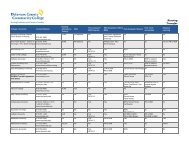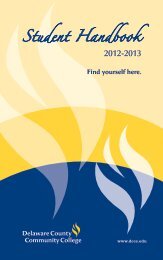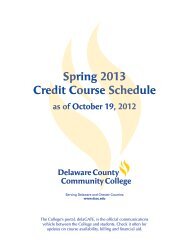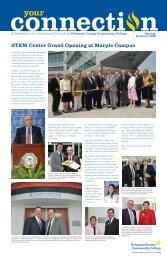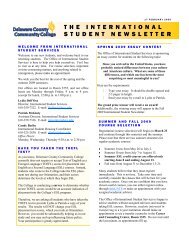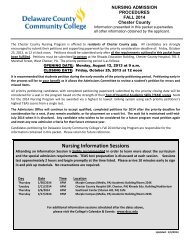2010 Catalog - Delaware County Community College
2010 Catalog - Delaware County Community College
2010 Catalog - Delaware County Community College
You also want an ePaper? Increase the reach of your titles
YUMPU automatically turns print PDFs into web optimized ePapers that Google loves.
COURSE DESCRIPTIONS 93<br />
Upon successful completion of this course, students<br />
should be able:<br />
• Write a complete Business Plan<br />
• Prepare and deliver an oral presentation on the<br />
Business Plan<br />
• Develop a strategic financial plan to obtain financing<br />
Prereq. BUS 105<br />
1 Credit<br />
BUS 110<br />
Sales and Sales Supervision<br />
This course provides a middle-management approach to<br />
sales as a function of the marketing process. Emphasis in<br />
the course is on theory and basic techniques of selling.<br />
Students are required to prepare and execute a formal<br />
sales presentation.<br />
Upon successful completion of this course, students<br />
should be able to:<br />
• Discuss the world of the salesperson, his/her needs,<br />
problems and accomplishments.<br />
• Develop interpersonal skills for successful lifetime use.<br />
• Employ techniques that enable a salesperson to sell a<br />
product or service.<br />
• Analyze the pressures of attempting to influence<br />
the buying habits of another person through<br />
personal interaction.<br />
• Construct a written sales proposal based on<br />
customer needs.<br />
• Apply various modes of communication to build effective<br />
business relationships.<br />
• Analyze the legal, social and ethical implications of<br />
persuasive forms of business communications.<br />
• Manage time and territory constraints.<br />
• Prepare and execute a formal sales presentation.<br />
Prereq. ENG 050 and REA 050<br />
3 Credits 3 Weekly Lecture Hours<br />
BUS 111<br />
International Management<br />
This course will provide an overview of the external<br />
political, cultural and economic forces operating on the<br />
practice of management in the multinational firm. In<br />
addition, the internal management will be examined to<br />
provide an understanding of both the functional areas<br />
and the overall management.<br />
Upon successful completion of this course, students<br />
should be able to:<br />
• Investigate special problems confronting international<br />
managers.<br />
• Discuss the differences among international managers.<br />
• Explain how sociocultural differences affect business.<br />
• Determine the major legal and financial problems that<br />
might affect business.<br />
• Analyze the available labor pool.<br />
• Examine planning and organizational global functions.<br />
• Discuss the unique international control and staffing<br />
considerations.<br />
Co-Requisite: ENG 100 - English Composition I<br />
Prereq. BUS 100 Coreq. ENG 100<br />
3 Credits 3 Weekly Lecture Hours<br />
BUS 130<br />
Business Communication<br />
This course focuses on the special needs of written<br />
and oral communication skills in the world of business.<br />
Emphasis is on the writing of letters, memos and reports,<br />
keeping a calendar, and researching business topics via<br />
the computer. The preparation of oral reports and<br />
presentation skills is also stressed.<br />
Upon success completion of this course, students should<br />
be able to:<br />
• Identify the fundamentals of communication theory and<br />
their relationship to business communication.<br />
• Apply the principles of effective communication to<br />
business situations that use memos, letters, proposals,<br />
and reports.<br />
• Organize business messages that are logical, complete,<br />
concise, grammatically correct, customer centered.<br />
• Electronically create business letters that respond to an<br />
inquiry, place an order, solicit a request, sell a product,<br />
adjust a billing, seek credit, respond to a claim, make<br />
collection on an account, and prepare a resume<br />
and cover letter<br />
• Research business topics using the Internet and other<br />
sources and prepare a report. Prepare and deliver an<br />
oral presentation on a business topic. Employ effective<br />
listening skills. Conduct an effective business meeting<br />
centering on a prepared agenda.<br />
Prereq. ENG 100 and DPR 100<br />
3 Credits 3 Weekly Lecture Hours<br />
BUS 149<br />
Small Business Management<br />
This course is designed to introduce students to the<br />
many facets of the small business from an entrepreneurial<br />
point of view. Small business managers and owners need<br />
a variety of exposure covering the entire span of operations<br />
and management. General concepts are reviewed to give<br />
students an introductory background in the world of small<br />
business. When the course is concluded, students should<br />
have the basic knowledge to make judgments as to further<br />
study necessary for their particular small business endeavor.<br />
Upon successful completion of this course, students<br />
should also be able to:<br />
• Use management skills in the areas of personnel,<br />
merchandising, budgeting and control.<br />
• Describe possible solutions to problems in the areas of<br />
strategic planning and management.<br />
• Assess the values and limitations of various<br />
financial opportunities.<br />
• Discuss the internal and external operations of a<br />
small business.<br />
• Conduct an audit and account for cash through<br />
managerial financial statements.<br />
• Analyze the implications of distribution systems for<br />
the small business.<br />
• Apply personnel management strategies.<br />
• Develop an awareness of the role of small business<br />
management in our social system.<br />
Prereq. ENG 050 and REA 050 or pass test<br />
3 Credits 3 Weekly Lecture Hours<br />
BUS 210<br />
Principles of Management<br />
This course is designed to present the functions and<br />
responsibilities of middle-management positions.<br />
Upon successful completion of this course, students<br />
should be able to:<br />
• Review the historical development of management<br />
theories and relate them to current management thought.<br />
• Use the planning process to accomplish both personal<br />
and organizational goals.<br />
• Explain the importance of and the procedure for<br />
organizing the workplace and defining tasks,<br />
responsibilities and relationships.<br />
• Describe the staffing process of recruitment, placement,<br />
training and development of organization members.<br />
• Identify the leadership and motivational traits and<br />
qualities necessary to accomplish organizational goals.<br />
• Discuss the tools and techniques used in the control process.<br />
• Analyze the decision-making and problem-solving<br />
methods that managers use.<br />
• Assess how the social, technological, economic and<br />
political/legal forces affect managers.<br />
Prereq. BUS 100, ENG 050 and REA 050 or pass test<br />
3 Credits 3 Weekly Lecture Hours<br />
BUS 211<br />
Supervision<br />
The major thrust of the course is the supervisor's<br />
relationship to employees at the first-level of management<br />
in day-to-day operations. It is an introductory approach to<br />
the understanding of basic skills and activities and skills<br />
required to supervise these workers effectively.<br />
Upon successful completion of this course, students<br />
should be able to:<br />
• Identify the supervisor's role in the work organization.<br />
• Apply the principles involved in planning, delegating,<br />
motivating, leading and communicating.<br />
• Use techniques necessary for successful supervision,<br />
including those involved in staffing, training,<br />
compensating, evaluating and discipline.<br />
• Relate problem-solving and decision-making to the<br />
challenges of the first-line supervisor.<br />
• Be cognizant of time management and conflict<br />
management skills.<br />
• Deal effectively with special problems such as stress,<br />
alcohol, drugs and employee theft.<br />
• Review the laws and regulations applicable at the<br />
supervisory level, including those pertaining to labor<br />
relations, equal employment, safety and protected<br />
employees.<br />
Prereq. ENG 050 and REA 050, or pass test<br />
3 Credits 3 Weekly Lecture Hours<br />
BUS 212<br />
Introduction to Sport<br />
Management<br />
This course explores the sport industry environment and<br />
introduces classic business and management concepts as<br />
they apply to this specific setting. Students are exposed to<br />
planning organizing leading and controlling strategies and<br />
skills with special emphasis on how they are applied in an<br />
organization operating within the demanding context of<br />
modern sports industry.<br />
Upon successful completion of this course a student<br />
should be able to:<br />
• Discuss the management skills functions and approaches<br />
applicable to a sports industry.<br />
• Describe the sports industry environment from global<br />
ethical and social perspectives.<br />
• Apply the decision making process within the sports<br />
industry including definition goal setting evaluating<br />
alternatives and implementation.<br />
• Verbalize the strategic planning process as it applies to<br />
the sports industry.<br />
• Articulate the key strategies utilized in event, facility, time<br />
and scheduling management.<br />
• Describe organizational design and function as it applies<br />
to the development of an innovative, flexible and diverse<br />
internal culture.<br />
• Enumerate the legal, social, collaborative and<br />
motivational aspects of human resource management<br />
within a sporting environment.<br />
• Describe the application of management control tactics to<br />
promote quality, productivity and integrity within a sports<br />
organization.<br />
Prereq. ENG 050 and REA 050, or pass test<br />
3 Credits 3 Weekly Lecture Hours<br />
BUS 213<br />
Leadership<br />
This course presents both theoretical and practical<br />
aspects of leadership functions needed to develop an<br />
effective and productive workforce. The major thrust of the<br />
course is student growth through reflection. Exercises<br />
introduce practical aspects of leadership in an organization.<br />
Upon successful completion of this course, students<br />
should be able to:<br />
• Differentiate between leadership and management.<br />
• Demonstrate why leadership is important to companies<br />
and countries.<br />
• Identify important leadership characteristics and<br />
behaviors.<br />
• Explain the difference between an effective and an<br />
ineffective leader.<br />
• Discuss how a leader attains goals through followers.<br />
• Compare and contrast power and influence and why they<br />
are important.<br />
• Analyze the leadership process in a framework of<br />
exercises and self-reflection.




